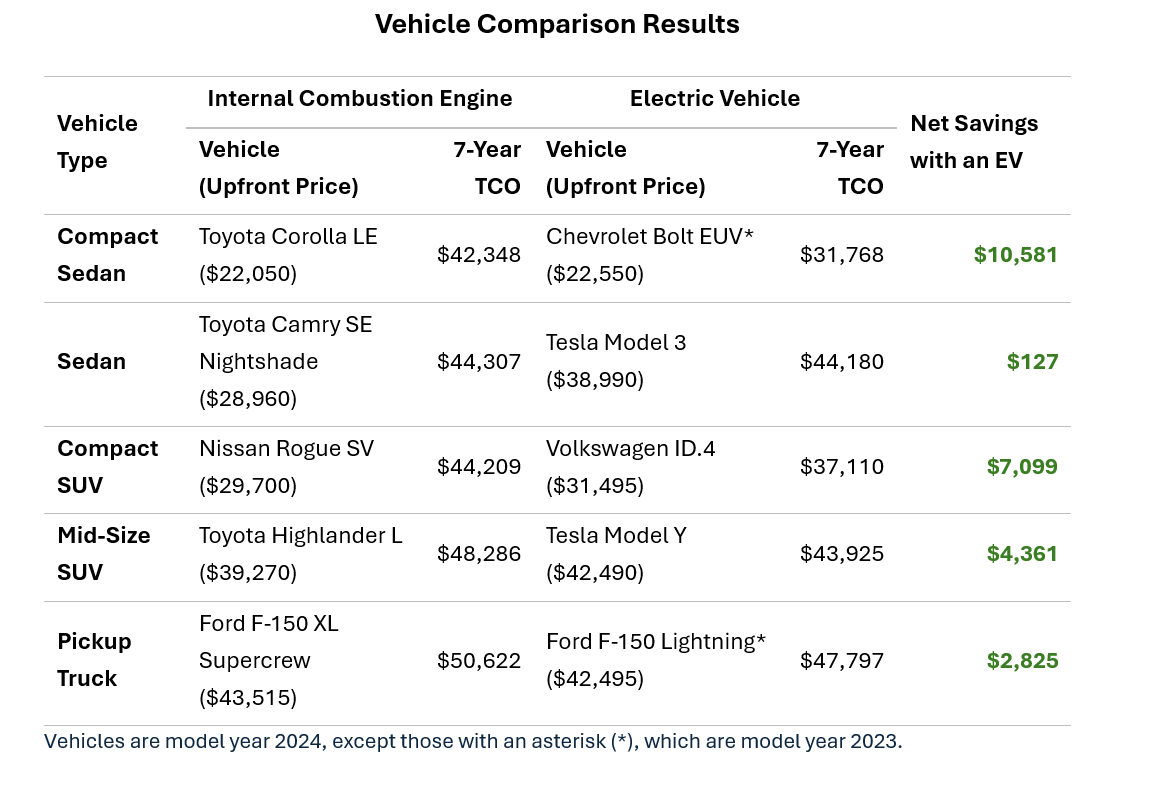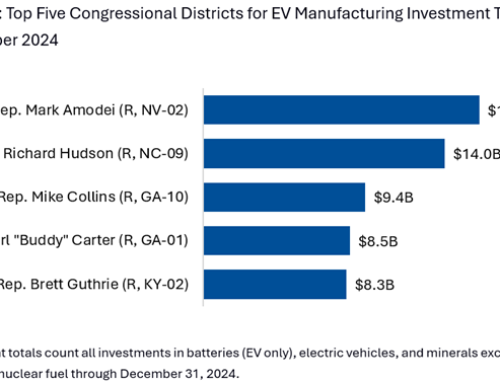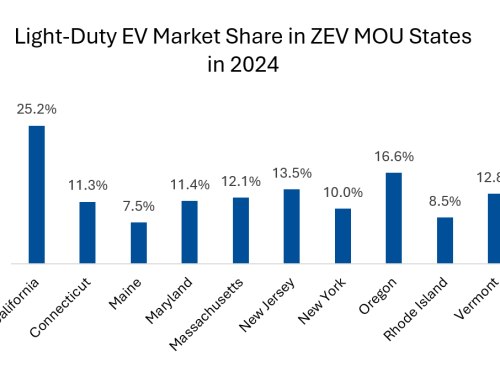
The following digest was written by Atlas Policy Analyst Daniel Wilkins.
Last week, we published a new analysis comparing the total cost of ownership (TCO) between five of the most popular gasoline powered models in the United States and an electric equivalent.
Our analysis found that in every case, EVs today can deliver savings to owners compared to a similar gasoline vehicle over a seven-year period—the typical amount of time a driver keeps a newly purchased vehicle. Each conventional vehicle selected was the most popular new vehicle of its type registered in the United States in 2023, according to S&P Global. This was based on vehicle make, model, series, and trim as defined by S&P Global. Comparable electric vehicles were chosen based on similar features, size, and utility. Notably, two of the top four new vehicles registered in 2023 were from Tesla, an all-electric manufacturer.
The analysis considered five common light-duty vehicle types, identifying the best-selling ICE vehicle and a comparable EV alternative for each segment:
-
Compact Sedan: Toyota Corolla LE and Chevrolet Bolt EUV
-
Sedan: Toyota Camry SE Nightshade and Tesla Model 3
-
Compact SUV: Nissan Rogue SV and Volkswagen ID.4
-
Midsize SUV: Toyota Highlander Land Tesla Model Y
-
Pickup: Ford F-150 XL Supercrew and Ford F-150 Lightning
The analysis assessed a wide range of ownership costs across each vehicle over a 7-year period including the upfront purchase price (minus resale price), fuel, maintenance, insurance, taxes, and fees. The analysis included the Federal Clean Vehicle Tax Credit (30D) for eligible EVs.
Here’s what we found:
Compact Sedans: Owning a Chevrolet Bolt EUV costs 25 percent less than a Toyota Corolla LE, translating to over $10,000 in savings over seven years.
Sedans: Owning the Tesla Model 3 costs less than one percent less than the Toyota Camry SE Nightshade over seven years on a TCO basis. However, if the Model 3 becomes eligible for the federal EV tax credit, it would be cheaper by 17 percent. Notably, the Model 3 has 58 percent lower cost for fuel.
Compact SUVs: Owning the Volkswagen ID.4 Pro EV costs 16 percent less than the Nissan Rogue SV over seven years on a TCO basis translating to over $7,000 in savings.
Mid-Size SUVs: Owning the Model Y costs nine percent less than the Toyota Highlander L over seven years on a TCO basis, with fuel for the Model Y costing 65 percent less.
Pickups: Owning the F-150 Lightning costs six percent less than its conventional counterpart over seven years on a TCO basis, with a significant 46 percent savings on fuel.
Fewer moving parts and the inherent efficiency of the electric drivetrain drives the cost savings for an EV compared to a conventional vehicle. Maintenance costs were nearly 40 percent lower, and the fuel costs were between 40 and 65 percent lower when compared to a gasoline vehicle. Combined, these savings outweighed the higher upfront costs of an EV, driving home the point that drivers must look beyond the upfront sticker price when they consider their next vehicle purchase. In addition to cost savings, EVs are more convenient to refuel nearly all of the time (88 percent in our estimate) thanks to home charging. While charging on the go is indeed possible, it may come at a higher cost, yet it doesn’t detract from the overall economic benefits. Additionally, the study didn’t delve into the performance advantages of electric vehicles, which include quicker acceleration and a smoother driving experience, further enriching their value proposition beyond just cost savings.
Implications for EV Adoption
Transportation is generally the second largest expenditure for people after housing, and over 90 percent of American households have at least one car. The findings show that many EVs available today are more affordable to drive than the most popular conventional vehicles on the market. Vehicle electrification is expected to improve affordability for households as technology costs continue to decline, more models become available, and the used market continues to grow.
The Fleet Procurement Analysis Tool
The analysis was conducted using the Fleet Procurement Analysis Tool (FPAT), a public Microsoft Excel-based application developed by Atlas to enable users to drive detailed insights into the financial viability and environmental impact of EV procurements. We invite you to explore the comparative total cost of ownership of EVs and ICE vehicles for yourself using the new Version 1.32 released alongside this analysis.

